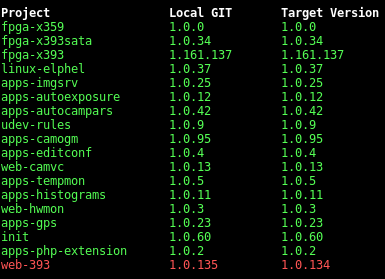Difference between revisions of "Poky manual"
From ElphelWiki
(→Use cases) |
(→Compare built vs deployed software versions) |
||
| Line 110: | Line 110: | ||
./check_versions.py root@192.168.0.9 | ./check_versions.py root@192.168.0.9 | ||
</font> | </font> | ||
| − | |||
| − | |||
| − | |||
{| | {| | ||
|[[File:Check versions.png|thumb|400px|check_versions.py output in terminal]] | |[[File:Check versions.png|thumb|400px|check_versions.py output in terminal]] | ||
|} | |} | ||
| − | |||
==<font color="blue">Details for development</font>== | ==<font color="blue">Details for development</font>== | ||
[[Development_for_10393|'''Development for 10393''']] | [[Development_for_10393|'''Development for 10393''']] | ||
Revision as of 11:38, 9 September 2019
Contents
Use cases
- Update Linux Kernel when developing a driver
- Include application to the default firmware package
- Update Elphel's PHP extension
- C/C++ applications if developed on PC require a cross-compiler and require Yocto installation or some other alternative.
Other projects written in Python, PHP, Javascript, HTML, C/C++ (gcc is installed on the system board) can be developed on the camera. Installing the framework is not required but it can simplify the development process.
Description
- Building embedded Linux image for Zynq ARMv7 platform - Elphel 10393 board
- Yocto Poky revision = 2.7.1 (Warrior)
- Yocto Poky revision = 2.4 (Rocko)
-
Yocto Poky revision = 2.0 (Jethro)
Features
- Environment is set up with a single script
- All Elphel projects are configured for Eclipse IDE:
- fpga projects (verilog)
- kernel
- applications projects
- All steps for fpga projects are run from Eclipse IDE
- Once everything is built it supports updating software projects (files and binaries) on the target system
- access is set up in yocto's local.conf (see setup.py output) + ssh-copy-id
- bitbake some-app -c target_scp from the command line or Eclipse IDE - see examples in elphel-apps-... at Git
Requirements
- Kubuntu 16.04 x64 (as of Dec 2018) - Poky: 2.4 Rocko, 2.7.1 Warrior
- Kubuntu 18.04 x64 (as of Dec 2018) - Poky: 2.7.1 Warrior (not tested but might build w/o problems)
Output files
The names are listed as they appear in the u-boot configuration header file - actual output files have different names:
| File(s) | Build Command | Description |
|---|---|---|
| boot.bin | bitbake u-boot | u-boot as the first stage bootloader = Secondary Program Loader (SPL) that boots u-boot-dtb.img |
| u-boot-dtb.img | bitbake u-boot | full size u-boot with a stripped device tree (cat u-boot.img some_stripped_devicetree.dtb > u-boot-dtb.img) |
| devicetree.dtb | bitbake device-tree | device tree with listed interfaces, zynq registers, interrupts and drivers
|
| uImage | bitbake linux-xlnx | kernel, drivers |
| rootfs.ubifs, rootfs.ubi, rootfs.tar.gz | bitbake core-image-elphel393 | rootfs in different formats - *.ubi* for NAND, *.tar.gz for mmc |
The file are located at elphel393/bootable-images/, which is a link to poky's deploy directory elphel393/poky/build/tmp/deploy/images/elphel393/
- complete set of files for rootfs in NAND Flash: elphel393/bootable-images/nand/
- complete set of files for rootfs on MMC (micro SD card): elphel393/bootable-images/mmc/
Write files to media and boot
Boot from micro SD card
- Use recovery or regular μSD card
- EXT4 partition mounted as /
Boot from NAND flash
- The default boot option - power on.
- A UBIFS image is written to /dev/mtd4 - is mounted as /
Notes
- Read more about boot options.
Setup
- Poky 2.4 Rocko (Kubuntu 16.04)
git clone -b rocko https://git.elphel.com/Elphel/elphel393.git cd elphel393 ./setup.py cd poky . ./oe-init-build-env bitbake u-boot device-tree linux-xlnx core-image-elphel393
- Poky 2.7.1 Warrior (Kubuntu 16.04 or 18.04)
git clone -b warrior https://git.elphel.com/Elphel/elphel393.git cd elphel393 ./setup.py cd poky . ./oe-init-build-env bitbake u-boot device-tree linux-xlnx core-image-elphel393
Compare built vs deployed software versions
cd elphel393 ./check_versions.py root@192.168.0.9
